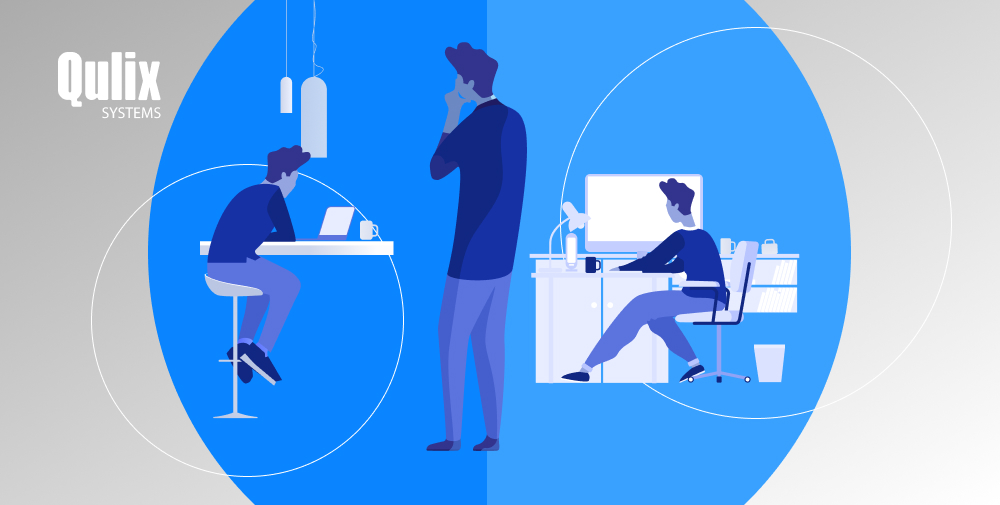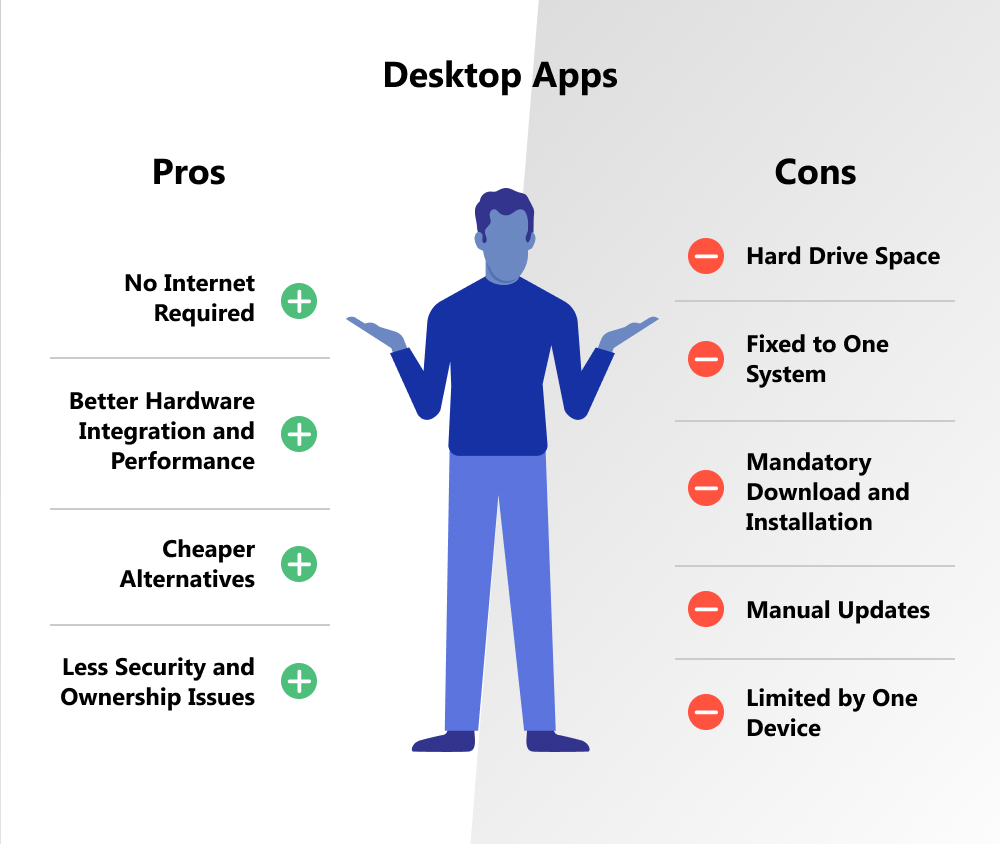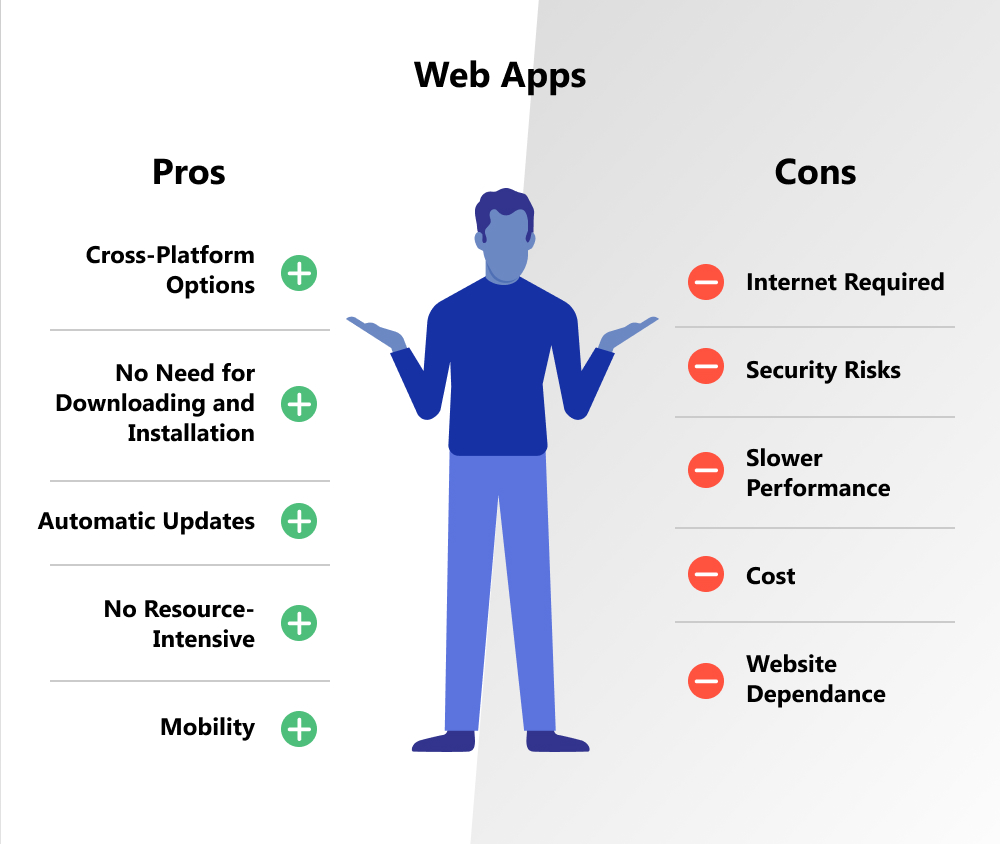Many apps play a huge role in our everyday and business lives, allowing us to make payments, manage meetings, create and edit content, analyze data, and much more. In 2021, users downloaded 143.6 billion applications, and this is just the beginning. This figure is expected to grow to 184 billion in 2024. In spite of the fact that people use various programs for different purposes, they still wonder about the contraposition "web app vs desktop app": which is better and which one would the user choose?
In our article we are going to come as close as possible to finding the answer to this challenging dilemma.
written by:
Nadezhda Mal
First of all, you should understand that every type has its own pros and cons, and it’s important to know what exactly you want to achieve depending on your project and goals. In this article, we will compare desktop and web applications, look at their strengths and weaknesses, and finally pick a winner. Let's start the battle!
Round 1. All you need to know about desktop apps
A desktop application is software that can be installed directly on your personal computer or laptop. It can be launched and run at any time regardless of other apps. You certainly use them in a permanent way. There are MS Office programs like Word, Excel, or Powerpoint, media players, video games, graphical editors like Paint and Photoshop, and many others.
You don’t need an Internet connection to start your desktop application but bear in mind that some apps require it to work properly. For example, there are Firefox or Chrome web browsers. Since they are installed on your PC, they are considered desktop apps. These programs have different features and can be simple or complex, resource-hungry or small-footprint, cost-intensive or cheap.
Desktop App Pros
No Internet Required
The World Wide Web is the main difference when we speak about desktop vs. web solutions. You don't need an Internet connection to launch your desktop app if it has already been installed on your PC. Therefore, it’s convenient to use desktop apps when you are on a trip or in locations with poor connectivity.
Better Hardware Integration and Performance
If you install a proper version of your desktop program, it will always integrate with your system well. When you download the program specifically designed for your hardware, this means that it will smoothly run on your machine. Also, desktop apps can operate faster and provide a larger set of features compared to a web-based application.
Cheaper Alternatives
When you buy the desktop version, this means that it belongs to you. You don’t need to pay for any subscriptions or make other additional payments. Yes, these programs can be more expensive than web-based apps, but they are usually one-time paid and don’t require any ongoing payments.
Less Security and Ownership Issues
Desktop applications allow you to save your private data locally rather than in clouds, which makes them more protected from hackers’ attacks. Using your desktop program offline also makes it possible to forget about losing your personal information. Do you have to share intellectual property like your own articles or songs? Then a desktop should be your choice. Like people say, all rights reserved.
Speaking about intellectual property, we should mention that when you create and save any files to your PC from the app, you will own them, which is not the case with web apps. You should always keep in mind that your content stored in the clouds can easily leak to the Internet.
Desktop App Cons
Hard Drive Space
You have to store desktop apps and the files they create on your hard drive. Some programs don’t occupy too much space, while others (like graphic editors or video recorders) take gigabytes of the memory. This, in turn, can adversely affect the performance of your device.
Fixed to One System
Most desktop applications are not portable. Of course, you can install and run them on your laptop whenever you need. But you can’t log in on another computer and continue using it as you can with a web application.
Mandatory Download and Installation
Before starting to use your desktop app, you must download and install it on your PC, which also takes time. Apart from that, your program will occupy some space and can leave some files after uninstallation.
Manual Updates
Unlike web-based apps, desktop software doesn’t update automatically. You will need to manually check, download, and install updates. At best, you will be notified that the app is available, but you still will have to perform some actions with it.
Limited by One Device
You can install desktop software only on one device, such as a computer or laptop. Simply put, you always need the same machine to access your program.
Round 2. Web apps from A to Z
A web application is software that is used through the Internet via your web browser. In this case, the files aren’t stored on your device. They will be located on the remote server. The browser gives you access to the application and its content. In contrast to simple static web pages, web-based apps are interactive. The user can easily create, edit, or delete content and data with the help of web applications.
Your messengers, text editors like Google Docs, or email services are examples of web applications. Since technology develops, they are getting new features and becoming more sophisticated. As a result, users get various complex video editors or graphic design instruments that can be run in the browser.
Web App Pros
Cross-Platform Options
These applications usually don’t depend on system or hardware specifications. Most of them need Internet access to run. You can launch them from any platform or device that has a browser. It doesn’t matter whether you work with Windows, Mac, Linux, or anything else because the app functionality is regulated by the components that are on the server.
No Need for Downloading and Installation
You can launch a web application by entering the appropriate link. This means that it won’t occupy space on your hard drive, and you will be able to access it from any device. In addition, you won’t spend time on downloading and installation. Some apps require you to register an account to save your progress and provide you with other features, but it's an easy and fast procedure.
Automatic Updates
Manual downloading, installation, and updating on a regular basis is annoying. Furthermore, it can be time-consuming because you have to wait until the updates are downloaded, approved, and installed. Automatic updating saves your time and allows you to use the latest stable version of your app.
No Resource-Intensive
You don’t need to have the most modern and powerful machine to launch your web application. Obviously, you should run the browser. The more tabs are opened, the more memory will be used. Nevertheless, these programs will demand less processing power. You will be able to work with your web app even if you have a weak PC or hardware.
Mobility
You can run a web app not only on your personal computer or laptop but also on your smartphone or tablet. It's evident that the functionality of some solutions may be limited due to the screen size. You won't be able to properly use complex web applications, such as audio mastering software or graphics editors because they need larger screens. But you will have access to a great number of enterprise web solutions that don't depend on the system or device. They allow you to stay in touch with your business processes.
Web App Cons
Internet Required
Web applications are reliant on Internet access. In other words, you won't be able to perform your tasks in case of any connectivity troubles. If you are time-sensitive and travel a lot, it's better to think about desktop-based solutions that can be run offline. This will allow you to avoid connection problems that can interrupt your operations.
Security Risks
Running online means that all your data will be stored in the public cloud, which may have security or privacy issues. Unlike desktop apps, web services can't allow you to control the protection of your personal and confidential information. So, you should be very careful with your sensitive data. Also, remember that your personal computer is less exposed to potential attacks. However, don't forget about antivirus solutions and firewalls!
Slower Performance
Web apps depend on the Internet connection and the number of users accessing them. Too many people and low speed will slow down your application. We have said above that the web service doesn't drain the resources of your computer. Well, this sword cuts both ways. Some web apps can be much slower than their desktop opponents. But this is the case of complex programs requiring much processing power.
Cost
Yes, web-based apps are cheaper than desktop apps. On the day of purchase. But in the long run, they turn out to empty your pocket more readily. It comes to subscriptions that are usually charged on a regular basis (e.g. every month, year, and so on). If you don't want to renew your subscription, you may be unable to work with your web app and lose the data stored in it.
Website Dependance
Web applications completely bank on a company’s website. So, if your website has some performance issues, your web app will also be in trouble. For example, if a user has to wait some time for your website URL to load, your application will never be able to load like a flash. That is why, you have to mind them in tandem as there is a close correlation between your website and the app.
So, Who Is the Winner?
It's difficult to make a choice, right? Everything depends on your needs and circumstances. Both variants have their pros and cons. Web apps are easy-to-use, accessible from any device, and mobile, while desktop applications offer you more privacy and security options, faster performance, and make you independent of the network. If you need mobility, choose a web service. If you're concerned about confidentiality, think about desktop programs.
If you still have any questions about desktop apps, web apps, or their development, please contact our support team or visit our website. Qulix Systems' experts will tell you everything you want to know in greater detail.

Contacts
Feel free to get in touch with us! Use this contact form for an ASAP response.
Call us at +44 151 528 8015
E-mail us at request@qulix.com









